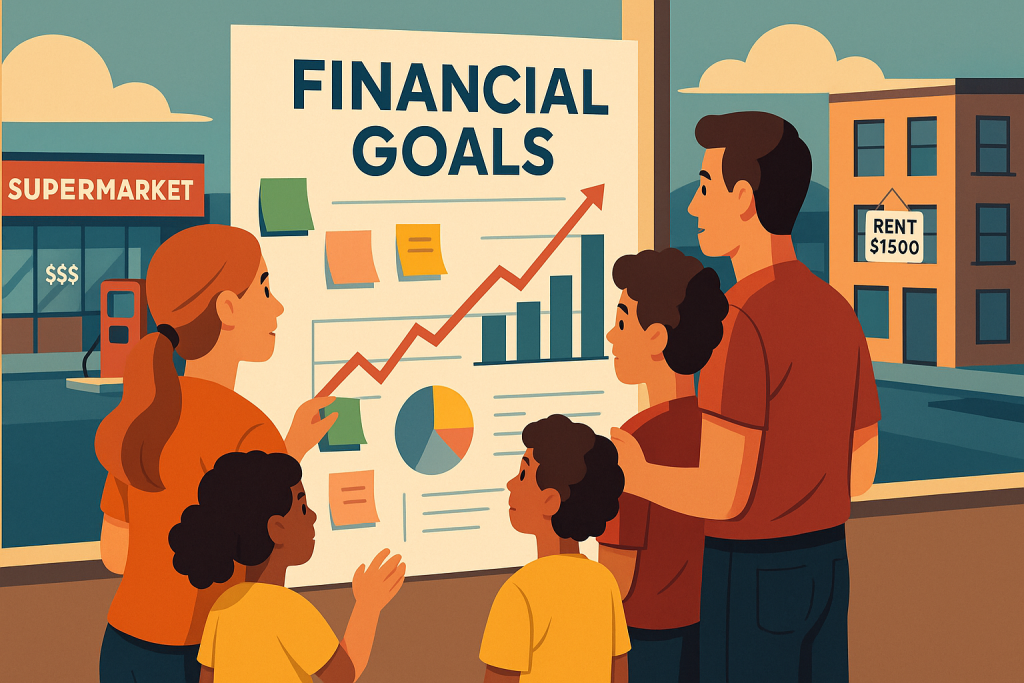The rising cost of living in the United States has become a significant concern for many individuals and families. As prices for essential goods and services keep inching upward, people are reevaluating their financial objectives. With the burden on household budgets increasing, the necessity to reconfigure financial strategies is becoming more evident.
Rising prices are influencing both short-term and long-term financial planning. From groceries and gas to housing and healthcare, the increase in living expenses affects how families allocate their resources. This surge is pushing people to prioritize certain expenses over others and, in many cases, to make tough choices about what they can afford to invest in their future.
The impact of inflation on personal finances

Inflation significantly affects personal finances, leading to major shifts in how people save and spend. As the cost of goods and services increases, purchasing power diminishes, forcing individuals to reassess their financial plans. Increased living costs can erode savings, making it more challenging to set aside money for future goals.
In addition, broader economic factors play a critical role in personal financial health. For instance, interest rates tend to rise alongside inflation, which can lead to higher costs for borrowing. This affects everything from mortgage rates to credit card debt.
As financial environments change, understanding these dynamics can help individuals plan more effectively and adjust their objectives to mitigate these challenges. Staying informed and adjusting strategies accordingly are necessary steps in navigating the current economic climate.
Navigating financial uncertainty
Given the uncertain environment, it can be daunting to navigate financial planning effectively. However, focusing on controllable factors can help manage some of the unpredictability. Budgeting becomes more critical during times of economic strain. Maintaining a clear and realistic plan allows individuals to track expenses better and identify areas for potential savings.
Keeping an eye on debt and trying to limit unnecessary spending are also beneficial steps in developing an adaptable, resilient financial plan. Moreover, seeking professional financial advice can be invaluable. Experts can provide insights and strategies tailored to individual circumstances, helping to avoid costly mistakes and prepare for potential challenges.
Whether it’s through financial literacy programs or one-on-one counseling, gaining knowledge and understanding of financial options can empower individuals to make informed decisions that align with their long-term dreams amidst changing times.
Rethinking priorities as living expenses soar
As living expenses continue to climb, people find themselves rethinking their priorities. Many are shifting focus from discretionary spending to essentials, challenging people to redefine their concept of “needs” versus “wants.” People are innovatively looking for ways to maintain their standard of living, such as finding supplementary income sources or adopting more frugal lifestyles.
Engaging in regular self-assessment and goal reevaluation can help manage these changes. Setting clear and achievable goals, considering current financial limitations, can facilitate more effective planning. Furthermore, leveraging technology for budgeting tools and resources can provide greater control over finances, enabling individuals to adapt swiftly to changing consumer prices without losing sight of their personal and financial values.
Practical steps for financial resilience
Building financial resilience in this environment means acknowledging the challenges while proactively strategizing for the future. Establishing an emergency fund is a critical step, providing a safety net during economic downturns. Moreover, diversifying income streams can offer greater stability. This could include side gigs, investments, or exploring new career opportunities for growth.
It’s equally important to prioritize debt management, focusing on reducing high-interest loans. Engaging with community resources or financial workshops can enhance financial literacy and prepare for unexpected economic shifts. Ultimately, financial stability is an ongoing journey that requires continuous adjustments and informed decisions.
